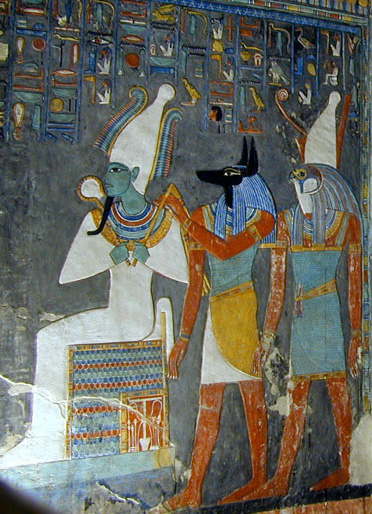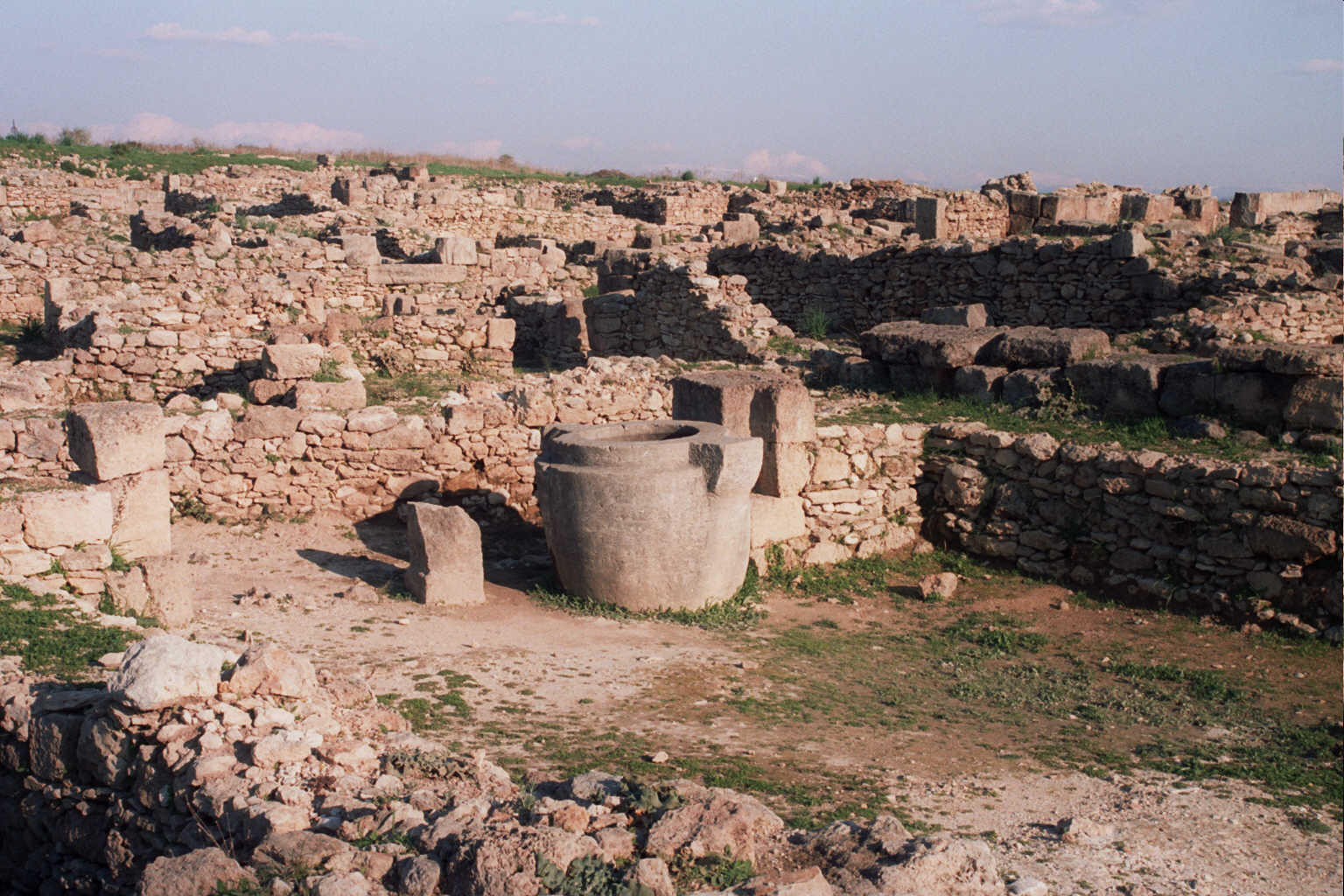|
Elohim
''Elohim'' ( ) is a Hebrew word meaning "gods" or "godhood". Although the word is plural in form, in the Hebrew Bible it most often takes singular verbal or pronominal agreement and refers to a single deity, particularly but not always the God of Judaism. In other verses it takes plural agreement and refers to gods in the plural. Morphologically, the word is the plural form of the word () and related to '' el''. It is cognate to the word ''ʾl-h-m'' which is found in Ugaritic, where it is used as the pantheon for Canaanite gods, the children of El, and conventionally vocalized as "Elohim". Most uses of the term ''Elohim'' in the later Hebrew text imply a view that is at least monolatrist at the time of writing, and such usage (in the singular), as a proper title for Deity, is distinct from generic usage as ''elohim'', "gods" (plural, simple noun). Rabbinic scholar Maimonides wrote that ''Elohim'' "Divinity" and ''elohim'' "gods" are commonly understood to be homonym ... [...More Info...] [...Related Items...] OR: [Wikipedia] [Google] [Baidu] |
El (deity)
El is a Northwest Semitic word meaning 'god' or 'deity', or referring (as a proper name) to any one of multiple major ancient Near Eastern deities. A rarer form, ''ila'', represents the predicate form in the Old Akkadian and Amorite languages. The word is derived from the Proto-Semitic *ʔil-. Originally a Canaanite deity known as ''El'', ''Al'' or ''Il'' the supreme god of the ancient Canaanite religion and the supreme god of East Semitic speakers in Early Dynastic Period of Mesopotamia. Among the Hittites, El was known as Elkunirša ( ). Although El gained different appearances and meanings in different languages over time, it continues to exist as ''El-'', ''-il'' or ''-el'' in compound proper noun phrases such as Elizabeth, Ishmael, Israel, Samuel, Daniel, Michael, Gabriel (Arabic: Jibra'il), and Bethel. Linguistic forms and meanings Cognate forms of El are found throughout the Semitic languages. They include Ugaritic , pl. ; Phoenician pl. ; Hebrew , pl. ... [...More Info...] [...Related Items...] OR: [Wikipedia] [Google] [Baidu] |
God In Judaism
In Judaism, God has been conceived in a variety of ways. Traditionally, Judaism holds that Yahweh—that is, the God in Abrahamic religions#Judaism, god of Abraham, Isaac and Jacob, and the national god of the Israelites—delivered them from The Exodus, slavery in Egypt, and gave them the Law of Moses at Mount Sinai (Bible), Mount Sinai as described in the Torah. Jews traditionally believe in a Monotheism, monotheistic conception of God ("Shema Yisrael, God is one"), characterized by both Transcendence (religion), transcendence (independence from, and separation from, the material universe) and immanence (active involvement in the material universe). God is seen as unique and perfect, free from all faults, and is believed to be omnipotent, omnipresent, omniscient, and Absolute infinite, infinite in all attributes, with no partner or equal, serving as the sole Creator deity, creator of everything in existence. In Judaism, Aniconism in Judaism, God is never portrayed in any ima ... [...More Info...] [...Related Items...] OR: [Wikipedia] [Google] [Baidu] |
Gods
A deity or god is a supernatural being considered to be sacred and worthy of worship due to having authority over some aspect of the universe and/or life. The ''Oxford Dictionary of English'' defines ''deity'' as a God (male deity), god or goddess, or anything revered as divine. C. Scott Littleton defines a deity as "a being with powers greater than those of ordinary humans, but who interacts with humans, positively or negatively, in ways that carry humans to new Higher consciousness, levels of consciousness, beyond the grounded preoccupations of ordinary life". Religions can be categorized by how many deities they worship. Monotheism, Monotheistic religions accept only one deity (predominantly referred to as "God"), whereas Polytheism, polytheistic religions accept multiple deities. Henotheism, Henotheistic religions accept one God, supreme deity without denying other deities, considering them as aspects of the same divine principle. Nontheistic religions deny any supreme eter ... [...More Info...] [...Related Items...] OR: [Wikipedia] [Google] [Baidu] |
Monotheism
Monotheism is the belief that one God is the only, or at least the dominant deity.F. L. Cross, Cross, F.L.; Livingstone, E.A., eds. (1974). "Monotheism". The Oxford Dictionary of the Christian Church (2 ed.). Oxford: Oxford University Press. A distinction may be made between exclusive monotheism, in which the one God is a singular existence, and both inclusive and pluriform monotheism, in which multiple gods or godly forms are recognized, but each are postulated as extensions of the same God. Monotheism is distinguished from henotheism, a religious system in which the believer worships one god without denying that others may worship different gods with equal validity, and monolatry, monolatrism, the recognition of the existence of many gods but with the consistent worship of only one deity. The term ''monolatry'' was perhaps first used by Julius Wellhausen. Monotheism characterizes the traditions of Abrahamic religions, Abrahamic religions such as Judaism, Samaritanism, Christi ... [...More Info...] [...Related Items...] OR: [Wikipedia] [Google] [Baidu] |
Kingdom Of Judah
The Kingdom of Judah was an Israelites, Israelite kingdom of the Southern Levant during the Iron Age. Centered in the highlands to the west of the Dead Sea, the kingdom's capital was Jerusalem. It was ruled by the Davidic line for four centuries. Jews are named after Judah, and primarily descend from people who lived in the region. The Hebrew Bible depicts the Kingdom of Judah as one of the two successor states of the Kingdom of Israel (united monarchy), United Kingdom of Israel, a term denoting the united monarchy under biblical kings Saul, David, and Solomon and covering the territory of Judah and Kingdom of Israel (Samaria), Israel. However, during the 1980s, Biblical minimalism, some biblical scholars began to argue that the archaeological evidence for an extensive kingdom before the late 8th century BCE is too weak, and that the methodology used to obtain the evidence is flawed. In the 10th and early 9th centuries BCE, the territory of Judah might have been limited ... [...More Info...] [...Related Items...] OR: [Wikipedia] [Google] [Baidu] |
Ancient Hebrew Religion
The most widespread belief among archeological and historical scholars is that the origins of Judaism lie in the Persian province of Yehud. Judaism evolved from the ancient Israelite religion, developing new conceptions of the priesthood, a focus on Written Law and scripture and the prohibition of intermarriage with non-Jews. During the Iron Age I period (12th to 11th centuries BCE), the religion of the Israelites branched out of the Canaanite religion and took the form of Yahwism. Yahwism was the national religion of the Kingdom of Israel and of the Kingdom of Judah. As distinct from other Canaanite religious traditions, Yahwism was monolatristic and focused on the particular worship of Yahweh, whom his worshippers conflated with El. Yahwists started to deny the existence of other gods, whether Canaanite or foreign, as Yahwism became more strictly monotheistic over time. During the Babylonian captivity of the 6th and 5th centuries BCE ( Iron Age II), certain circles ... [...More Info...] [...Related Items...] OR: [Wikipedia] [Google] [Baidu] |
Maimonides
Moses ben Maimon (1138–1204), commonly known as Maimonides (, ) and also referred to by the Hebrew acronym Rambam (), was a Sephardic rabbi and Jewish philosophy, philosopher who became one of the most prolific and influential Torah scholars of the Middle Ages. In his time, he was also a preeminent astronomer and physician, serving as the personal physician of Saladin. He was born on Passover eve 1138 or 1135, and lived in Córdoba, Spain, Córdoba in al-Andalus (now in Spain) within the Almoravid dynasty, Almoravid Empire until his family was expelled for refusing to convert to Islam. Later, he lived in Morocco and Egypt and worked as a rabbi, physician and philosopher. During his lifetime, most Jews greeted Maimonides' writings on Halakha, Jewish law and Jewish ethics, ethics with acclaim and gratitude, even as far away as Iraq and Yemen. Yet, while Maimonides rose to become the revered head of the History of the Jews in Egypt, Jewish community in Egypt, his writings also ... [...More Info...] [...Related Items...] OR: [Wikipedia] [Google] [Baidu] |
Deity
A deity or god is a supernatural being considered to be sacred and worthy of worship due to having authority over some aspect of the universe and/or life. The ''Oxford Dictionary of English'' defines ''deity'' as a God (male deity), god or goddess, or anything revered as divine. C. Scott Littleton defines a deity as "a being with powers greater than those of ordinary humans, but who interacts with humans, positively or negatively, in ways that carry humans to new Higher consciousness, levels of consciousness, beyond the grounded preoccupations of ordinary life". Religions can be categorized by how many deities they worship. Monotheism, Monotheistic religions accept only one deity (predominantly referred to as "God"), whereas Polytheism, polytheistic religions accept multiple deities. Henotheism, Henotheistic religions accept one God, supreme deity without denying other deities, considering them as aspects of the same divine principle. Nontheistic religions deny any supreme eter ... [...More Info...] [...Related Items...] OR: [Wikipedia] [Google] [Baidu] |
Canaanite Gods
Canaanite religion or Syro-Canaanite religions refers to the myths, cults and ritual practices of people in the Levant during roughly the first three millennia BC. Canaanite religions were polytheistic and in some cases monolatristic. They were influenced by neighboring cultures, particularly ancient Egyptian and Mesopotamian religious practices. The pantheon was headed by the god El and his consort Asherah, with other significant deities including Baal, Anat, Astarte, and Dagon. Canaanite religious practices included animal sacrifice, veneration of the dead, and the worship of deities through shrines and sacred groves. The religion also featured a complex mythology, including stories of divine battles and cycles of death and rebirth. Archaeological evidence, particularly from sites like Ugarit, and literary sources, including the Ugaritic texts and the Hebrew Bible, have provided most of the current knowledge about Canaanite religion. Sources and history Knowledge a ... [...More Info...] [...Related Items...] OR: [Wikipedia] [Google] [Baidu] |
Grammatical Number
In linguistics, grammatical number is a Feature (linguistics), feature of nouns, pronouns, adjectives and verb agreement (linguistics), agreement that expresses count distinctions (such as "one", "two" or "three or more"). English and many other languages present number categories of singular or plural. Some languages also have a Dual (grammatical number), dual, #Trial, trial and #Paucal, paucal number or other arrangements. The word "number" is also used in linguistics to describe the distinction between certain grammatical aspects that indicate the number of times an event occurs, such as the semelfactive aspect, the iterative aspect, etc. For that use of the term, see "Grammatical aspect". Overview Most languages of the world have formal means to express differences of number. One widespread distinction, found in English and many other languages, involves a simple two-way contrast between singular and plural number (''car''/''cars'', ''child''/''children'', etc.). Discussion ... [...More Info...] [...Related Items...] OR: [Wikipedia] [Google] [Baidu] |
Divinity
Divinity (from Latin ) refers to the quality, presence, or nature of that which is divine—a term that, before the rise of monotheism, evoked a broad and dynamic field of sacred power. In the ancient world, divinity was not limited to a single deity or abstract ideal but was recognized in multiple forms: as a radiant attribute possessed by gods, as a vital force pervading nature, and even as a quality glimpsed in extraordinary humans, laws, or acts. The Latin and its Greek counterparts (, ) conveyed something both immanent and awe-inspiring: a presence that could be felt in thunder, justice, ecstasy, fate, or beauty. Among the Greeks and Romans, divinity was not confined to a rigid theological system. Gods, heroes, and even emperors might be described as partaking in divinity, just as natural forces or virtue could be seen as expressions of divine essence. Philosophers such as Plato and the Stoics used the term to refer to the soul of the cosmos or the rational order ... [...More Info...] [...Related Items...] OR: [Wikipedia] [Google] [Baidu] |









